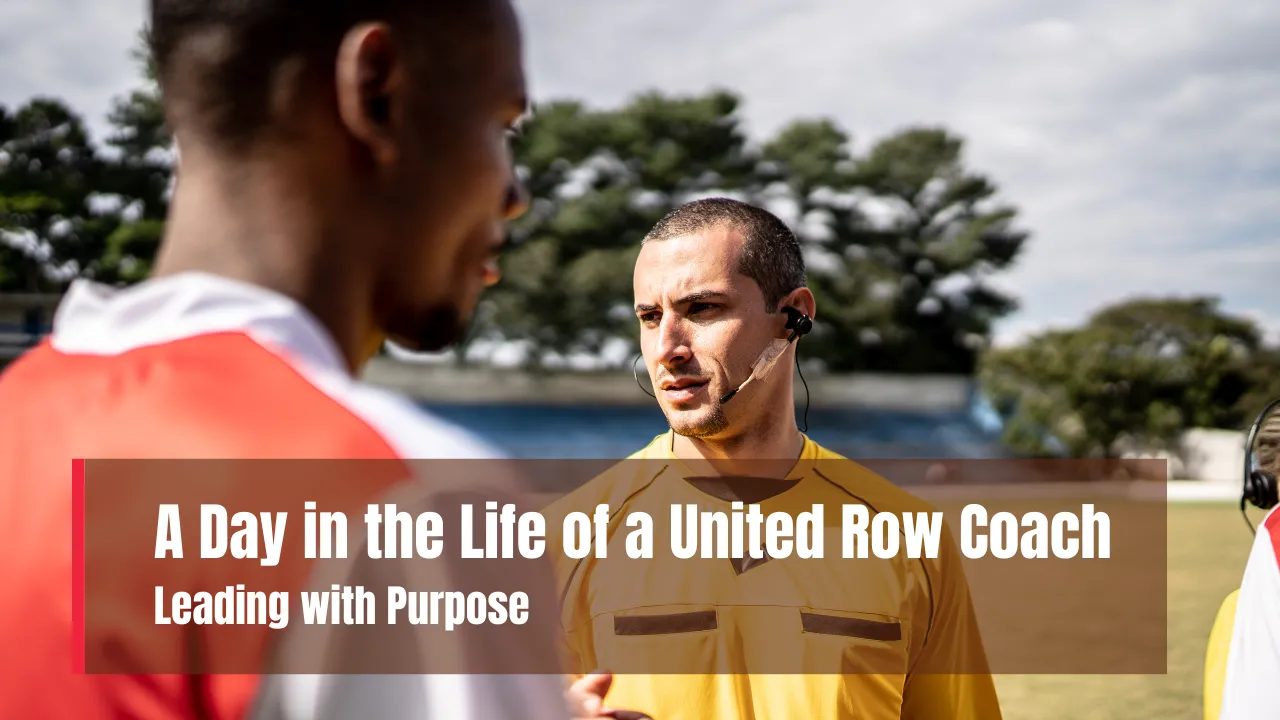United Row Coach: A United Row Coach starts before the world wakes up, moving through the early morning mist with clarity and purpose. Their job isn’t just about boats and oars; it’s about shaping athletes, building team culture, and striving for excellence on every stroke. Behind the calm waters lies a deeply demanding role—one that blends passion with performance and discipline with direction.
This article takes you through the authentic, day-to-day journey of a United Row Coach, offering an inside look at how these leaders build athletes, maintain structure, and carry the heartbeat of a rowing program. From pre-dawn practices to late-night planning, you’ll see just how much heart and hustle goes into leading a rowing crew to success.
The Role of a United Row Coach
A United Row Coach holds a unique position at the crossroads of leadership, training, and mentorship. They are responsible for guiding both the physical performance and mental toughness of their rowing crew. With a deep understanding of biomechanics, water conditions, and team psychology, these coaches shape not only better athletes but also better people. Their focus goes beyond just rowing workouts — they create a full-circle experience that includes technique refinement, athlete mindset, goal-setting, and strategic planning. From coaching novice rowers to preparing elite athletes for international competition, the United Row Coach plays a critical role in the growth and success of any rowing program.
| Daily Task | Purpose | Time |
| Early morning water practice | Technical drills and team synchronization | 5:00 AM – 7:30 AM |
| Equipment checks & maintenance | Ensuring boat safety and performance | 7:30 AM – 8:00 AM |
| Team meeting & strategy | Discussing feedback, goals, and progress | 9:00 AM – 10:00 AM |
| Individual coaching sessions | Personal development and technique tuning | 11:00 AM – 1:00 PM |
| Planning and analysis | Reviewing video, planning race strategy | 2:00 PM – 4:00 PM |
| Evening follow-up | Answering questions, logistics updates | 6:00 PM – 7:00 PM |
Early Mornings on the Water
The day kicks off before most alarms go off. At around 4:30 AM, a United Row Coach is already awake, mentally preparing for a day on the water. By 5:00 AM, they’re out at the boathouse, checking the weather, inspecting equipment, and greeting athletes as they arrive. This quiet, focused time sets the tone for the day’s first training session.
Morning practices are high-value windows for building rhythm, endurance, and timing. The coach carefully observes each stroke, calling out corrections and refining movements. The water’s calmness allows for pure concentration, giving both the athletes and the coach a chance to tune into their performance without distractions.
Developing Strategy and Technique
Technical refinement is at the heart of rowing success. A United Row Coach dedicates significant time to observing form, identifying inefficiencies, and guiding adjustments. This process isn’t guesswork — it’s built on data, repetition, and athlete feedback.
Coaches film sessions from the launch boat and later break down the footage to analyze timing, power distribution, and blade work. Then they convert those insights into actionable coaching strategies. Whether it’s a new stroke sequence or adjusting seat positions for better boat balance, each decision is intentional and tailored to the team’s current needs.
Strategic planning also includes prepping for upcoming regattas. Coaches balance intensity and rest in training plans, making sure the crew peaks at the right moment. These decisions are shaped by experience, athlete readiness, and seasonal goals.
Communication and Leadership
Effective communication is central to coaching leadership. A United Row Coach doesn’t just shout commands; they listen, motivate, and cultivate a team-first environment. Leadership is shown in how a coach responds to setbacks, navigates conflict, and reinforces accountability.
Team meetings are structured but open. Athletes are encouraged to share input, which deepens the team’s collective understanding of performance goals. These conversations aren’t always easy, but they are essential to long-term cohesion.
On a personal level, coaches mentor athletes through both sports-related and personal challenges. Whether someone is struggling with performance anxiety or balancing school with rowing, the coach provides guidance, not judgment.
Managing Logistics
Behind the performance lies meticulous logistics. A United Row Coach is responsible for organizing everything from transportation to nutrition plans. This includes communicating with the rowing club, booking equipment, confirming race schedules, and managing rosters.
Time is split between coaching on the water and managing tasks like athlete check-ins, gear inventories, and recovery protocols. These moving parts must run smoothly for athletes to focus on their development.
Coaches also coordinate with physiotherapists, strength trainers, and sport psychologists when needed. Their role bridges every support system in the athlete’s journey, acting as the center point of communication and action.
Mentoring and Mental Support
The emotional aspect of coaching is often overlooked, but it’s one of the most powerful tools a United Row Coach possesses. They act as mentors — not just in rowing, but in life. Building a winning mindset is as important as refining a perfect stroke.
Mental training involves teaching focus under pressure, bouncing back after defeats, and remaining disciplined during grueling sessions. Through trust and consistency, a coach becomes a steady presence in an athlete’s life. For young rowers especially, this mentorship leaves a lasting impact that goes far beyond rowing lanes.
Highlights of a United Row Coach’s Day
- Morning Practice Sessions
The backbone of every training day, these sessions focus on endurance, drill work, and synchronization. Real-time correction helps athletes improve quickly, while team rhythm is built stroke by stroke. - Video Review and Team Meetings
After lunch, coaches lead strategy sessions using practice footage. Athletes see their movements, correct errors, and understand where the boat gains or loses speed. These meetings create a shared understanding of team goals and improvement areas.
Challenges Faced Daily
A United Row Coach faces obstacles every day. Unpredictable weather, equipment issues, or an athlete pulling out due to injury can throw plans off track. Emotional fatigue is another challenge—balancing empathy with expectations isn’t easy.
Then there’s the complexity of team dynamics. Not all athletes develop at the same pace, and keeping the crew unified takes consistent leadership. The ability to adapt, stay calm, and think ahead defines a great coach.
Rewards of Coaching with Purpose
Despite the challenges, the rewards of this career are deeply meaningful. Watching an athlete achieve a personal best, witnessing a team row in perfect harmony, or simply seeing confidence grow in a once-hesitant rower — these moments are priceless.
A United Row Coach sees beyond wins and losses. They measure success by growth, resilience, and the values their athletes carry long after their competitive days are over. It’s a legacy built not just on medals, but on the people they help shape.
FAQs
What does a United Row Coach do daily?
Is coaching rowing physically demanding?
What makes a good rowing coach?
Do United Row Coaches travel for events?
How does a coach improve athlete performance?
Final Thought
The life of a United Row Coach is anything but ordinary. It’s a career rooted in passion, shaped by discipline, and driven by purpose. These leaders wear many hats: coach, mentor, planner, motivator. Through early mornings, tough sessions, and personal sacrifice, they help athletes achieve greatness both in and out of the boat.
If you’ve ever wondered what true leadership looks like in sports, look no further than the calm but commanding presence of a rowing coach on a foggy morning. Their purpose is clear, their mission is lasting, and their impact is unforgettable.
If this inspired you or offered insight into rowing life, leave a comment or share with someone who loves the sport.












